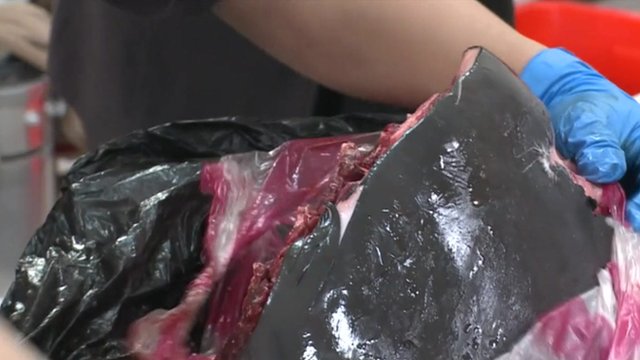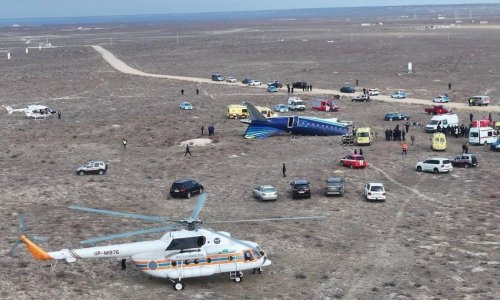My cameraman and I recently visited Yunlin, in western Taiwan, where there is a long tradition of eating dolphin. Considered good for one's health, even though it is full of mercury, dolphin meat is so commonly eaten here that it is called the "ocean's pork". It is an open secret among locals.Because it is illegal, we went undercover and ordered dolphin meat at a stall known to sell it. But the boss said she no longer sold it. Asked whether the fried cakes she served actually contained the meat, she did not deny it."Some people say this is dolphin meat," she said.The raw meat looked like dolphin flesh. Asked about that, she simply laughed. At one point she admitted she sold the meat, when we asked her why the fried dolphin meat cakes were not thought to taste fishy and whether it was because of the way she marinated it. "That's right," she said.Just to be sure, we asked a friend who grew up in the area and has eaten the meat many times to help. A few days later, he was able to order dolphin cakes with no problem.Stockpile seizedAt Taiwan's fishing ports, coast guard officers routinely check boats returning from sea to see if illegal marine life has been caught. Despite a stiff penalty - up to five years in jail and a maximum fine of $50,000 (£30,000) - dead dolphins have been found.In early March, coast guard officers uncovered three bags of dolphin meat hidden in a fishing boat. The fisherman claimed he accidentally caught the dolphin and had not intended to kill it. But to mask what it really was, he had chopped off the head, tail and fins.Other cases have been discovered in the past two years.In the biggest case late last year, 7.5 tonnes of dolphin meat were found in a refrigerated warehouse in southern Taiwan, the largest stockpile discovered in recent years.Officials estimate 150 dolphins were killed. The vendor who collected it told police he could make $3 for every 500 grams, or more than $6,500 if he had sold all of it.Experts believe many cases are not discovered, and as many as 1,000 dolphins are brought ashore by Taiwanese fishermen each year. The fishermen do not intentionally hunt for dolphins, but the mammals eat the same kind of fish the fishermen try to catch, and tend to follow the fishing boats, so they often get caught in the fishing nets.Because the mammals need to breathe, and cannot survive for more than five to 10 minutes without oxygen, they drown in the nets and are dead by the time they are brought up to the boats. Some experts believe several thousand dolphins die this way each year.Local fishermen told the BBC they felt no sympathy for the dolphins.That is the root of the problem - in Taiwan laws are sometimes passed because the government feels it must do something, including to protect Taiwan's image, but on the grassroots level people have not bought into the need for the law."Dolphins are our worst enemy. They eat all our fish bait - they follow us everywhere. We can't get rid of them other than killing them," said Chen Chun-sheng, president of the Suao Fishermen's Association in north-eastern Taiwan's Yilan county."But international conventions don't allow this. So when they get into our net, we catch them. We don't intentionally kill them. But if there's a bad person and you catch him in your hand, don't you want him to die?"Lin Chen-an, a spokesman for the association of some 17,500 fishermen, added: "If they accidentally catch the dolphins, the fishermen will bring it back; they think it is a shame to throw it back into the sea. Some people eat the meat themselves; some sell it to restaurants."'Destroyed the evidence'But there is a sign of hope for dolphins. Commissioned by the government's Council of Agriculture (COA), a professor has developed the first test of its kind that detects whether the meat is dolphin within minutes.With this test, authorities hope to police the illegal dolphin trade more effectively."It's been perplexing the COA for a long time; they used to use DNA to try to prove the meat is dolphin meat, but the results take one to two weeks to come back and they can't do anything during that time," said Jack Yang Wei-cheng, the professor, who teaches at National Chiayi University Department of Veterinary Medicine."By the time the results come back, the violators have destroyed the evidence and fled."The government also subsidises fishermen to operate dolphin-watching tours and conversation groups to teach children at coastal schools that whales and dolphins should be protected.However, animal protection groups say more needs to be done, including discouraging fishermen from using fishing methods that harm the animals.With one of the world's largest fishing industries, Taiwan has been blamed by environmental groups for overfishing or illegal fishing. Its nearby waters used to be teeming with whales and dolphins, but some believe numbers may be dwindling."We don't know if the overall population is increasing or decreasing, but nonetheless, the foundation feels we should protect dolphins. Only when their population is healthy is the whole ocean healthy," said Chang Tai-di, director of Kuroshio Ocean Education Foundation."We think dolphins are here because the ecology is rich."'Hard to catch'Despite the recent cases, Lin Kuo-chang, chief of the Forestry Bureau's Wildlife Conservation Section, said in recent years fishermen have become much more aware of protecting dolphin species.Some employ ways to prevent the dolphins from accidentally being caught in the nets, such as by using sound waves, boats or bamboo sticks to dispel the dolphins.But as our visit to Yunlin and talking to people have shown, some local authorities either cannot or do not feel they can crack down on violators."It's not easy to catch the people selling the meat," said Guo Tzy-ming, an inspector of illegal wildlife trade in northern Taiwan's Yilan County."You need to know people who are regular customers at the restaurants. The meat is not on menus and it's not displayed openly, but placed inside, in a refrigerator. To check the fridge, we have to have a court order. But before we can apply for one, people have to report the violations."He says his office handled less than a handful of cases in the 15 years he has worked there.So the jury is still out on how far the new litmus paper test, public education, and threatened punishment will go to end the dolphin meat trade.Demand for dolphin meat still exists in Taiwan. That means more dolphins will suffer a grisly fate.(BBC)ANN.Az
Why Taiwan's illegal dolphin meat trade thrives - PHOTO
World
13:00 | 04.04.2014

Why Taiwan's illegal dolphin meat trade thrives - PHOTO
Taiwan banned catching, selling and eating dolphins in 1989, after it faced international pressure. But recent cases have shown that there is still an active black market trade in dolphin meat. Though eating dolphin is not widespread on the island, the practice still exists in some areas.
Follow us !










